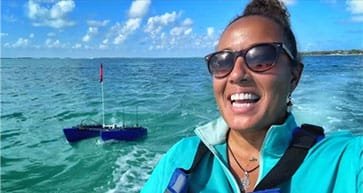
Economic empowerment through environmental markets
Economic empowerment through environmental markets https://www.globalclimatefinanceaccelerator.com/wp-content/uploads/2024/08/nikita.jpg 363 193 Global Climate Finance Accelerator Global Climate Finance Accelerator https://www.globalclimatefinanceaccelerator.com/wp-content/uploads/2024/08/nikita.jpgGiven the extreme vulnerability of coastal communities to rising sea levels, coral reef bleaching, and extreme weather events, solutions for protecting them were a key item on the agenda at Afreximbank’s annual meeting in The Bahamas.
In an interview with African Business following the AGM, I highlighted a transformative opportunity to empower local communities most affected by climate change and biodiversity loss. These communities can play a crucial role in leading the necessary adaptation to survive. By providing them with scientific knowledge about climate change—its impacts and effective response strategies— coupled with the right technology, we enable them to become active participants in protecting their environment. This also ensures the long-term sustainability of their revenue-generating industries, particularly tourism, which is especially vital when owned by the local communities themselves.
The Cat Island Conservation Institute works in the Caribbean and Africa to build the capacity of local people to participate in a sustainable blue economy. These regions suffer from a lack of data about our oceans. The Institute’s capacity building helps individuals develop the skills needed to thrive in this new science-based ocean economy, including the training and technologies required for accurate data collection about climatic patterns. Many of these coastal communities in Africa and the Caribbean are oblivious to the power and potential within the ocean, which is their birthright. Training on the scientific principles that govern the oceans they call home must be delivered in a language and format they understand and honours local cultures and traditions.
The Conservation Institute provides comprehensive training that allows local people to collect reliable data crucial for scientific research on climate change. This data helps us understand changes in shifting weather patterns, and biodiversity changes, specifically the health of our seagrasses, coral reefs, and fish populations. For example, we don’t have a clear picture of how rainfall patterns are changing in our communities. This lack of data makes it difficult to prepare for extreme weather events, be they devastating floods or prolonged droughts, that have become increasingly common, as we saw in Kenya recently. These extreme weather events are causing disasters and death, even though the communities they affect haven’t significantly contributed to the changing climate causing these events.
Strategic and well-funded knowledge transfer equips communities with the tools and resources to become custodians of technologies generating the data underpinning the carbon and biodiversity markets in the blue economy. These markets can unlock capital for climate mitigation and adaptation solutions, safeguarding our vital ecosystem services with the potential to transform the lives of local communities through economic empowerment. By empowering local communities to access these opportunities, we advance towards a socially inclusive financial architecture.
Access to capital, however, poses a significant barrier.
Banks in the Global North view us as high risk. We must find ways to de-risk local populations to facilitate investment. When local ownership in businesses attracting foreign direct investment, such as tourism, becomes the norm, rather than the exception, not only is the experience more powerful – since it’s grounded in the local culture – but income stays in the country, thereby transforming the local economy.
A sustainable blue economy is one in which we have eliminated the barriers to participation in revenue-generating opportunities presented by the ocean.
Nikita Shiel-Rolle is the founder of Young Marine Explorers Bahamas (YME Bahamas) and the Cat Island Conservation Institute, a Bahamian non-profit organisation dedicated to marine conservation. She has a Master’s degree in Biodiversity Wildlife and Ecosystem Health from the University of Edinburgh and a Bachelor’s degree in Marine Affairs & Policy from the Rosenstiel School of Marine and Atmospheric Science at the University of Miami.
